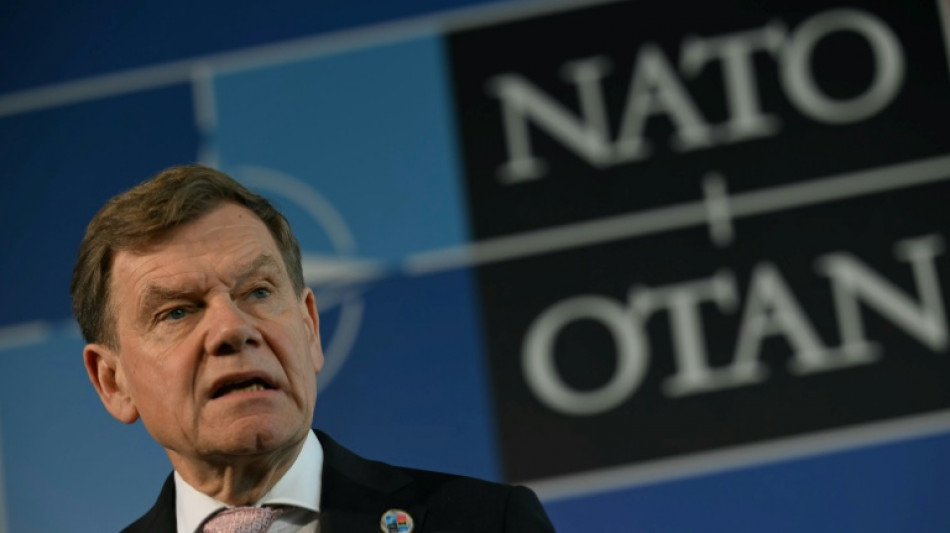
-
 Record flooding hits Vietnam city, eight killed in north
Record flooding hits Vietnam city, eight killed in north
-
Battling cancer made Vendee Globe win 'more complicated', says skipper Dalin

-
 England, Portugal, Norway closing in on 2026 World Cup
England, Portugal, Norway closing in on 2026 World Cup
-
Child protection vs privacy: decision time for EU

-
 Bear injures two in Japan supermarket, man killed in separate attack
Bear injures two in Japan supermarket, man killed in separate attack
-
In Simandou mountains, Guinea prepares to cash in on iron ore

-
 Morikawa says not to blame for 'rude' Ryder Cup fans
Morikawa says not to blame for 'rude' Ryder Cup fans
-
Far right harvests votes as climate rules roil rural Spain

-
 'Return to elegance': highlights from Paris Fashion Week
'Return to elegance': highlights from Paris Fashion Week
-
Britain's storied Conservative party faces uncertain future
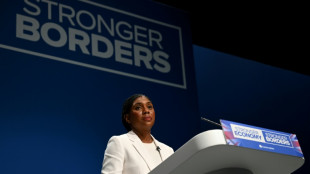
-
 New Zealand's seas warming faster than global average: report
New Zealand's seas warming faster than global average: report
-
Snakebite surge as Bangladesh hit by record rains

-
 Yankees deny Blue Jays playoff sweep as Mariners beat Tigers
Yankees deny Blue Jays playoff sweep as Mariners beat Tigers
-
Australia police foil 'kill team' gang hit near daycare centre

-
 US, Qatar, Turkey to join third day of Gaza peace talks in Egypt
US, Qatar, Turkey to join third day of Gaza peace talks in Egypt
-
Gold tops $4,000 for first time as traders pile into safe haven

-
 Indian garment exporters reel under US tariffs
Indian garment exporters reel under US tariffs
-
NBA back in China after six-year absence sparked by democracy tweet

-
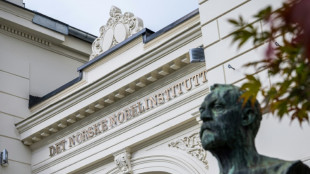 Energy storage and new materials eyed for chemistry Nobel
Energy storage and new materials eyed for chemistry Nobel
-
Trump unlikely to win Nobel Peace Prize, but who will?

-
 Qatar, Turkey to join third day of Gaza peace talks in Egypt
Qatar, Turkey to join third day of Gaza peace talks in Egypt
-
Study finds women have higher genetic risk of depression
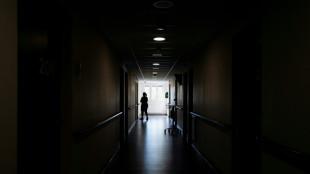
-
 Dolly Parton's sister calls for fan prayers over health issues
Dolly Parton's sister calls for fan prayers over health issues
-
On Trump's orders, 200 troops from Texas arrive in Illinois
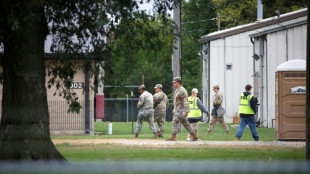
-
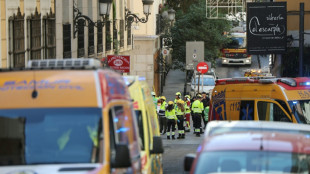 Two bodies found, two missing after Madrid building collapse
Two bodies found, two missing after Madrid building collapse
-
Panthers raise banner as NHL three-peat bid opens with win

-
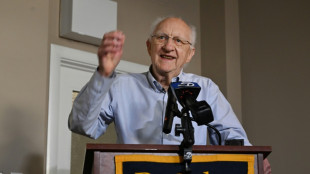 Nobel physics laureate says Trump cuts will 'cripple' US research
Nobel physics laureate says Trump cuts will 'cripple' US research
-
UFC star McGregor suspended 18 months over missed drug tests

-
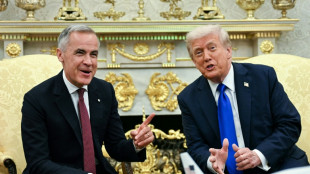 Trump talks up Canada trade deal chances with 'world-class' Carney
Trump talks up Canada trade deal chances with 'world-class' Carney
-
Ecuador president unharmed after apparent gun attack on motorcade
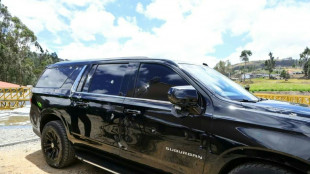
-
 Lyon exact revenge on Arsenal, Barca thrash Bayern in women's Champions League
Lyon exact revenge on Arsenal, Barca thrash Bayern in women's Champions League
-
Trump says 'real chance' to end Gaza war as Israel marks attacks anniversary

-
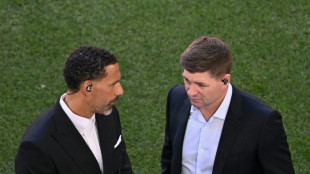 Gerrard brands failed England generation 'egotistical losers'
Gerrard brands failed England generation 'egotistical losers'
-
NFL fines Cowboys owner Jones $250,000 over gesture to fans
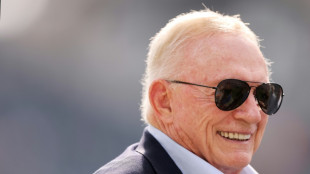
-
 Bengals sign veteran quarterback Flacco after Burrow injury
Bengals sign veteran quarterback Flacco after Burrow injury
-
New prime minister inspires little hope in protest-hit Madagascar

-
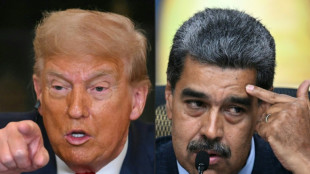 Is Trump planning something big against Venezuela's Maduro?
Is Trump planning something big against Venezuela's Maduro?
-
EU wants to crack down on 'conversion therapy'

-
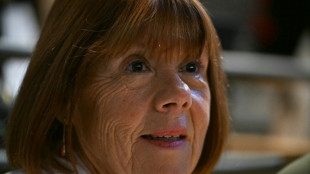 French sex offender Pelicot says man who abused ex-wife knew she was asleep
French sex offender Pelicot says man who abused ex-wife knew she was asleep
-
Trump says 'real chance' to end Gaza war as Israel marks Oct 7 anniversary

-
 UK prosecutors to appeal dropped 'terrorism' case against Kneecap rapper
UK prosecutors to appeal dropped 'terrorism' case against Kneecap rapper
-
Spain, Inter Miami star Alba retiring at end of season

-
 EU targets foreign steel to rescue struggling sector
EU targets foreign steel to rescue struggling sector
-
Trump talks up Canada deal chances with visiting PM
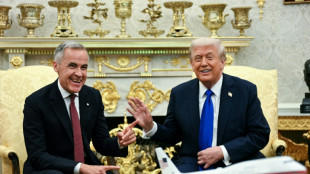
-
 Knight rides her luck as England survive Bangladesh scare
Knight rides her luck as England survive Bangladesh scare
-
Pro-Gaza protests flare in UK on anniversary of Hamas attack

-
 Top rugby unions warn players against joining rebel R360 competition
Top rugby unions warn players against joining rebel R360 competition
-
Outcast Willis 'not overthinking' England absence despite Top 14 clean sweep

-
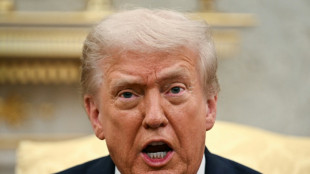 Trump says 'real chance' of Gaza peace deal
Trump says 'real chance' of Gaza peace deal
-
Macron urged to quit to end France political crisis
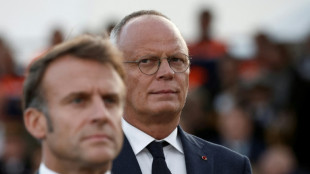

'Paradigm shift': Germany says to meet Trump's NATO spending target
Germany under new Chancellor Friedrich Merz surprised NATO allies on Thursday by signalling plans to massively boost defence spending to five percent of GDP as demanded by US President Donald Trump.
The pledge, made by the foreign minister at NATO talks in Turkey, came a day after conservative Merz, in office for just over a week, said his government planned to build up "the strongest conventional army in Europe".
Security expert Roderich Kiesewetter of Merz's conservative CDU party called the move a "paradigm shift", speaking to Bild daily, adding that "it won't happen overnight, but it has to happen".
For now those goals sound highly ambitious, given the dire state of the German armed forces which, defence experts warn, have been plagued by shortages of key weapons systems and faced trouble recruiting new troops.
Germany, with its dark World War II history, has long been reluctant to spend big on defence. Funding dropped off sharply after the Cold War as European countries relied on NATO heavyweight the United States for security.
Decades of lower military spending since the Berlin Wall fell, the so-called "peace dividend", has reduced Germany's number of battle tanks and howitzers from the thousands to the hundreds.
In recent years, Germany's Bundeswehr, as it deployed in Afghanistan and Mali, was often mocked for equipment failures, including helicopters that couldn't fly and rifles that did not shoot straight.
The army, hoping to boost its troop strength to 203,000 by 2031, has struggled to find new recruits despite a social media advertising blitz, falling short last year by over 20,000.
The military still has "too little of everything" -- from air defences and drones to satellites and AI capabilities -- the parliamentary commissioner for the armed forces, Eva Hoegl, warned in March.
- 'Epochal shift' -
Trump has long railed against NATO members not paying their fair share, and Germany only just hit the alliance target last year of spending two percent of GDP on defence.
Russia's full-scale invasion of Ukraine in 2022 led then chancellor Olaf Scholz to declare an "epochal shift" and announce 100 billion euros in extra defence spending.
Major orders have been placed, including for new German-built submarines and American-made F-35 fighter jets, but they will take years to build and deliver.
Now Merz has signalled an even bigger shift, warning against the strategic threat posed by a hostile Russia, while also seeking to repair Berlin's strained ties with the Trump administration.
Announcing his plans to strengthen the army, he said on Wednesday that "our friends and partners also expect this from us. Indeed, they practically demand it."
NATO chief Mark Rutte has floated a plan for alliance members to spend 3.5 percent of GDP on their militaries and another 1.5 percent on other security measures such as infrastructure and cyber defence.
On Thursday at NATO talks in Antalya, German Foreign Minister Johann Wadephul pointed to Rutte's proposal to reach "the five percent that President Trump demanded" and declared that "we follow him there".
- 'Collective madness' -
For Germany, this would equate to more than 200 billion euros per year -- a figure long deemed wildly unrealistic.
But Merz's coalition government has since secured major financial firepower -- an easing of debt rules and approval for hundreds of billions in extra funding for defence and infrastructure.
Merz told Die Zeit weekly that spending big on defence -- especially European-made systems -- should not be seen as a "burden" but instead as a stimulus for the recession-hit economy.
"If we want to strengthen our defence capabilities, we must gradually reduce our dependence on the US," he said.
The CEO of German defence giant Rheinmetall, Armin Papperger, said that, after it stepped up capacity in recent years, "we can deliver and stand by our responsibility".
Heated debate meanwhile quickly flared in Germany, where MP Peter Boehringer of the far-right and Moscow-friendly Alternative for Germany (AfD) called the move "completely absurd".
But criticism of Trump's five-percent demand also came from Ralf Stegner of the SPD, the junior coalition partner in the Merz government.
Stegner told the Handelsblatt daily that, in a conflict-torn world, "disarmament is the order of the day... not an arms race".
Spending "billions on weapons that reduce the world to rubble and ashes and then billions for the reconstruction of Gaza, Ukraine and Aleppo, that is collective madness", he said.
E.Gasser--VB
